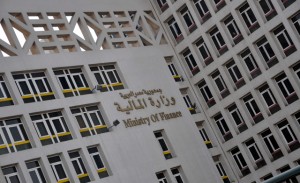
(DNE File Photo)
Egypt’s government is currently working on the launch of a new economic stimulus package to boost the sectors that are necessary to economic development such as the industrial, housing and construction, communication and tourism sectors, the Ministry of Finance’s July bulletin stated.
The new package aims to revitalise and expand the activities of the private sector through removing the “bottlenecks” facing economic key sectors, the report said.
After the ouster of former president Mohamed Morsi, the interim government announced two economic stimulus packages. The first package, with a value of EGP 29.6bn, was announced in August 2013 and focuses on infrastructure-related projects.
In December, the government had announced a second stimulus package, with a value of EGP 30bn, of which EGP 20bn will be directed to development projects, funded by the United Arab Emirates. The remaining EGP 10bn, provided by the government, will finance the minimum income system and social security programmes.
The report noted that the second half of FY 2014/2015 is expected to witness a “development surge” as a result for implementing the projects of the two stimuli packages announced in 2013.
Ministry of Finance added that Balance of Payments (BOP) has registered an overall surplus of $2.2bn during the first nine months of FY 2013/2014, compared to a $2.1bn deficit in the same period in the previous fiscal year, the Ministry of Finance’s July bulletin showed.
The ministry stated that the improvements witnessed are attributed to a surge in cash transfer from Gulf countries in addition to a net official transfer of cash of $6.5bn during the period of study.
Domestic liquidity has grown by 17% month-on-month by the end of May compared to a 16.5% growth in April, the ministry said. Meanwhile, the internal and external budget debt of the budget has registered EGP 1.806tn in March 2014, equivalent to 88.8% of GDP, compared to EGP 1.562tn in March 2013.
The Ministry of Finance stressed in the report that the reforms made to the 2014/2015 state budget aim to stimulate the economy, boost employment rates and support social justice.
The 2014/2015 budget was approved by President Abdel Fattah Al-Sisi after making adjustments on the draft that was referred to the presidency on the first day of the presidential elections. In the draft, the targeted revenues were around EGP 517bn while the expenditures were EGP 807bn; however, after amending it, revenues were set at EGP 549bn and total expenditures were set at EGP 789bn.
The adjustments Al-Sisi made included reducing petroleum subsidies to EGP 100.2bn from EGP 104bn in the draft, compared to EGP 134bn allocated in the FY 2013/2014 budget, and decreasing allocations for electricity subsidies from EGP 33bn in the draft to EGP 27.2bn, compared to approximately EGP 18bn in last year’s budget.


